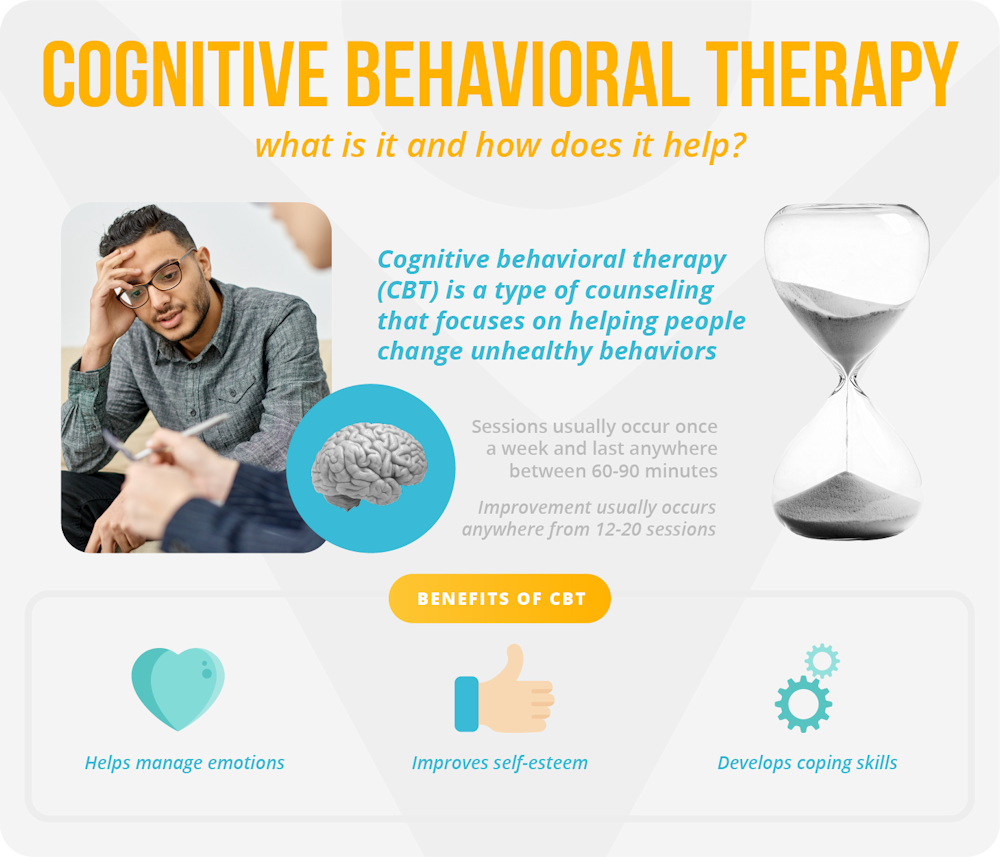Are you struggling with substance dependence and a mental health disorder? Or do you know someone else who is struggling with these co-occurring disorders? If so, then consider entering a program that promotes cognitive-behavioral therapy (CBT).
This therapeutic approach is one of the most effective practices out there today for helping individuals overcome mental health problems or substance abuse issues. Cognitive-behavioral therapy has stood the test of time and is scientifically proven to be a very effective method for managing mental health and substance abuse issues. At Free by the Sea, we invite both individuals and their families to our facility in the State of Washington to experience the benefits that CBT has to offer.
What is Cognitive Behavioral Therapy?
 Cognitive behavioral therapy is a therapeutic approach that seeks to change the way recovering individuals think. It works to address negative thoughts and replace them with positive ones.
Cognitive behavioral therapy is a therapeutic approach that seeks to change the way recovering individuals think. It works to address negative thoughts and replace them with positive ones.
Therapy is one of the most important components of treatment for addiction. The detox phase of treatment helps individuals to end the physical use of drugs and alcohol. But, addiction involves multiple areas of a person’s life. While detox and the beginning stages of treatment help to treat the physical side of addiction, it’s also necessary to address the emotional and mental areas of a struggling individual’s life.
When it comes to substance use disorders, professionals understand that struggling individuals experience many changes in their lives as a result of substance use. Often, those who suffer from alcoholism or drug misuse also find themselves encountering emotional and mental health disturbances.
In many cases, those who are living with addiction have harmful and dangerous thought processes. Sometimes, these negative cognitive patterns can contribute to substance use. They can also hinder people from moving forward on the road to recovery. This is where CBT steps in.
While in a cognitive behavioral therapy session, individuals can begin to discover, identify, and address the thought processes that might be considered negative. Again, these harmful thought processes could very well be contributing to the addiction in a person’s life. So, it’s important to uncover these cognitive distortions and address them in a healthy way.
Some of the Strategies Used in CBT
One of the strategies cognitive behavioral therapy uses is the idea of dealing with fear. Many individuals who are working to recover from addiction struggle with fear. Sometimes, people are afraid of failure as it relates to recovery. Others may feel afraid of a future without substance use. Some may feel afraid of the recovery process and the changes they will encounter.
CBT works to help people to identify their fears and deal with them in a healthy way. The main goal of this strategy is to encourage individuals to see their fears and address them rather than run away from them. This can help people both during and after treatment. After all, fear is often what keeps people from making progress. Individuals who suffer from substance use disorders may turn to alcohol or drug use when they are faced with fear. But, CBT works to help end this harmful coping mechanism.
Another strategy of cognitive behavioral therapy is the idea of developing and using coping mechanisms. Individuals who are suffering from addiction may struggle to deal with difficult situations. They may not really spend time addressing conflicts or concerns in their lives. But, CBT works to help instill healthy and effective coping methods so that individuals can deal with serious and difficult circumstances when they arise. These problem-solving skills are bound to help individuals even after treatment is over.
Finally, CBT uses the strategy of mindfulness. It can be hard for people to stay in the here and now. Those in recovery may have trouble focusing on what is important in the moment. But cognitive behavioral therapy helps individuals to focus on the present. It helps people to think more critically about their current situations and relax while in the moment. These mindfulness exercises can help recovering individuals immensely.
Identifying the Goals of CBT
Cognitive behavioral therapy has several goals because treatment can be applied in many different ways. CBT can be used by both individuals and groups to help get a better understanding of their mental health and behavioral health disorders. Therapy works to find solutions to the problems that these disorders may be causing. It also works to ensure that these solutions remain effective in the long run.
CBT will help individuals self-manage the stress and other negative effects that their mental illness is causing. In group support therapy, the focus is on preventing relapses and discouraging any behaviors that can lead to having low self-esteem. Families can also take advantage of Free by the Sea’s CBT programs to help get a better understanding of how to make their loved one’s life better and reduce their own stress. While the goals of CBT significantly vary depending on the case, the therapy itself always aims to make a lifelong impact on the patient.
What are the Benefits of Cognitive Behavioral Therapy?
As is the case with many other types of therapy, CBT has many benefits. Some of these advantages are immediate while others may be more long-term. Patients who successfully go through this type of therapy are likely to feel more secure about their future and more at peace with their challenges after finishing treatment.
A good home environment is important in a patient’s recovery. CBT aims to help break down the communication barrier that exists between patients and their loved ones by teaching families how to communicate clearly and more effectively to avoid any unnecessary arguments that may otherwise occur.
Cognitive behavioral therapy also has many long-term benefits. Patients can learn how they can grow as a result of their experiences so that in the future, they can better adapt to the constantly changing dynamics of the real world.
CBT is highly effective because it helps patients learn to recover in their own way. Because this type of therapy is so flexible, patients and their families are able to have a better life after completing it.
This therapeutic approach can also produce the following benefits:
- Boosts self-confidence
- Encourages critical thinking
- Helps people to recognize unhealthy thoughts
- Motivates individuals to think positively about themselves and others
- Emphasizes the importance of working through emotions and thoughts to find solutions
- Provides an environment where people can safely discuss past experiences and challenges
Those who are in the process of recovering from substance use disorders can find the help they need through the environment that a cognitive behavioral therapy program provides.
Who Benefits from Treatment That Involves CBT?
Cognitive behavioral therapy is a good option for treating a wide array of mental disorders. For instance, it could be a great option for someone who is suffering from a mental problem, such as depression, wild mood swings, or bipolar disorder. It can also be beneficial for someone who is looking for a healthy way to cope with everyday life while living with a more complex problem, such as anxiety or an eating disorder.
CBT has even proven to be effective for individuals struggling with more severe issues, such as schizophrenia or other long-term mental illnesses. Also, many patients turn to this form of therapy because they are trying to overcome a substance abuse problem. No matter what the mental health problem is, an individual who seeks treatment is more likely to successfully manage their problems and live a happier life.
Is Free by the Sea’s CBT Therapy Program Effective?
At Free by the Sea, all of our CBT practitioners are substance use disorder professionals who are at the top of the mental health field. They will help patients address and address and work through their addictions and other mental problems. Our expert practitioners will identify your addiction cycle and figure out a solution that will make a huge impact in the long run. During treatment, a focus is placed on finding new ways for patients to turn negativity into a positive motivator. The entire team at Free by the Sea works hard to provide support as you get back control of your life.
Contact Free By the Sea Today!
Maybe you’ve been struggling with alcoholism, prescription drug misuse, heroin use, cocaine dependence, or any other addiction. Perhaps you have felt lost or unable to navigate through your struggles. If so, you are not alone. Many others are struggling to reach out for help. But, it is important to end addiction sooner than later. So, there is no time like the present to speak with our professional team here at Free by the Sea. Now is the time to find hope and healing.
Here at Free by the Sea, we work together to develop and carry out the most individualized treatment approaches for our clients. We understand that you are unique and you have your own story. This is why we strive to provide a safe and understanding treatment process for each of our patients.
At our facility, you will find peace and encouragement. You will also find a staff that is committed to your health and safety.
You do not have to struggle with substance dependence any longer. Allow us to help you find your way to a life of freedom! Contact us today to learn more about our services and substance use disorder treatment programs.

Dr. Richard Crabbe joined our team in 2019 as our psychiatrist and medical director. He attended the University of Ghana Medical School where he became a Medical Doctor in 1977. From 1978 through 1984, he was a medical officer in the Ghana Navy and provided a variety of services from general medicine to surgeries. He received his Certificate in General Psychology from the American Board of Psychology and Neurology in 2002.



